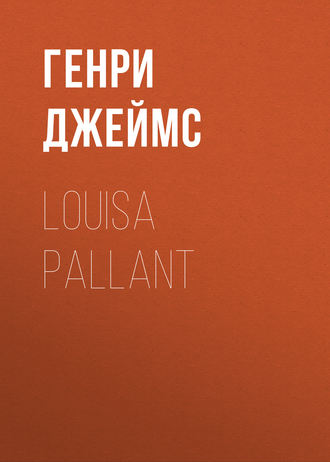
Генри Джеймс
Louisa Pallant
"Oh she'll live to do better," said Mrs. Pallant.
"How can she do better—since you've described all she finds Archie as perfection?"
She knew quite what she meant. "Ah better for HIM!"
I still had her hand—I still sought her eyes. "How came it you could throw me over—such a woman as you?"
"Well, my friend, if I hadn't thrown you over how could I do this for you?" On which, disengaging herself, she turned quickly away.
VI
I don't know how deeply she flushed as she made, in the form of her question, this avowal, which was a retraction of a former denial and the real truth, as I permitted myself to believe; but was aware of the colour of my own cheeks while I took my way to Stresa—a walk of half an hour—in the attenuating night. The new and singular character in which she had appeared to me produced in me an emotion that would have made sitting still in a carriage impossible. This same stress kept me up after I had reached my hotel; as I knew I shouldn't sleep it was useless to go to bed. Long, however, as I deferred this ceremony, Archie had not reappeared when the inn-lights began here and there to be dispensed with. I felt even slightly anxious for him, wondering at possible mischances. Then I reflected that in case of an accident on the lake, that is of his continued absence from Baveno—Mrs. Pallant would already have dispatched me a messenger. It was foolish moreover to suppose anything could have happened to him after putting off from Baveno by water to rejoin me, for the evening was absolutely windless and more than sufficiently clear and the lake as calm as glass. Besides I had unlimited confidence in his power to take care of himself in a much tighter place. I went to my room at last; his own was at some distance, the people of the hotel not having been able—it was the height of the autumn season—to make us contiguous. Before I went to bed I had occasion to ring for a servant, and I then learned by a chance enquiry that my nephew had returned an hour before and had gone straight to his own quarters. I hadn't supposed he could come in without my seeing him—I was wandering about the saloons and terraces—and it had not occurred to me to knock at his door. I had half a mind to do so now—I was so anxious as to how I should find him; but I checked myself, for evidently he had wanted to dodge me. This didn't diminish my curiosity, and I slept even less than I had expected. His so markedly shirking our encounter—for if he hadn't perceived me downstairs he might have looked for me in my room—was a sign that Mrs. Pallant's interview with him would really have come off. What had she said to him? What strong measures had she taken? That almost morbid resolution I still seemed to hear the ring of pointed to conceivable extremities that I shrank from considering. She had spoken of these things while we parted there as something she would do for me; but I had made the mental comment in walking away from her that she hadn't done it yet. It wouldn't truly be done till Archie had truly backed out. Perhaps it was done by this time; his avoiding me seemed almost a proof. That was what I thought of most of the night. I spent a considerable part of it at my window, looking out to the couchant Alps. HAD he thought better of it?—was he making up his mind to think better of it? There was a strange contradiction in the matter; there were in fact more contradictions than ever. I had taken from Louisa what she told me of Linda, and yet that other idea made me ashamed of my nephew. I was sorry for the girl; I regretted her loss of a great chance, if loss it was to be; and yet I hoped her mother's grand treachery—I didn't know what to call it—had been at least, to her lover, thoroughgoing. It would need strong action in that lady to justify his retreat. For him too I was sorry—if she had made on him the impression she desired. Once or twice I was on the point of getting into my dressing-gown and going forth to condole with him. I was sure he too had jumped up from his bed and was looking out of his window at the everlasting hills.
But I am bound to say that when we met in the morning for breakfast he showed few traces of ravage. Youth is strange; it has resources that later experience seems only to undermine. One of these is the masterly resource of beautiful blankness. As we grow older and cleverer we think that too simple, too crude; we dissimulate more elaborately, but with an effect much less baffling. My young man looked not in the least as if he had lain awake or had something on his mind; and when I asked him what he had done after my premature departure—I explained this by saying I had been tired of waiting for him; fagged with my journey I had wanted to go to bed—he replied: "Oh nothing in particular. I hung about the place; I like it better than this one. We had an awfully jolly time on the water. I wasn't in the least fagged." I didn't worry him with questions; it struck me as gross to try to probe his secret. The only indication he gave was on my saying after breakfast that I should go over again to see our friends and my appearing to take for granted he would be glad to come too. Then he let fall that he'd stop at Stresa—he had paid them such a tremendous visit; also that he had arrears of letters. There was a freshness in his scruples about the length of his visits, and I knew something about his correspondence, which consisted entirely of twenty pages every week from his mother. But he soothed my anxiety so little that it was really this yearning that carried me back to Baveno. This time I ordered a conveyance, and as I got into it he stood watching me from the porch of the hotel with his hands in his pockets. Then it was for the first time that I saw in the poor youth's face the expression of a person slightly dazed, slightly foolish even, to whom something disagreeable has happened. Our eyes met as I observed him, and I was on the point of saying "You had really better come with me" when he turned away. He went into the house as to escape my call. I said to myself that he had been indeed warned off, but that it wouldn't take much to bring him back.
The servant to whom I spoke at Baveno described my friends as in a summer-house in the garden, to which he led the way. The place at large had an empty air; most of the inmates of the hotel were dispersed on the lake, on the hills, in picnics, excursions, visits to the Borromean Islands. My guide was so far right as that Linda was in the summer-house, but she was there alone. On finding this the case I stopped short, rather awkwardly—I might have been, from the way I suddenly felt, an unmasked hypocrite, a proved conspirator against her security and honour. But there was no embarrassment in lovely Linda; she looked up with a cry of pleasure from the book she was reading and held out her hand with engaging frankness. I felt again as if I had no right to that favour, which I pretended not to have noticed. This gave no chill, however, to her pretty manner; she moved a roll of tapestry off the bench so that I might sit down; she praised the place as a delightful shady corner. She had never been fresher, fairer, kinder; she made her mother's awful talk about her a hideous dream. She told me her mother was coming to join her; she had remained indoors to write a letter. One couldn't write out there, though it was so nice in other respects: the table refused to stand firm. They too then had pretexts of letters between them—I judged this a token that the situation was tense. It was the only one nevertheless that Linda gave: like Archie she was young enough to carry it off. She had been used to seeing us always together, yet she made no comment on my having come over without him. I waited in vain for her to speak of this—it would only be natural; her omission couldn't but have a sense. At last I remarked that my nephew was very unsociable that morning; I had expected him to join me, but he hadn't seemed to see the attraction.
"I'm very glad. You can tell him that if you like," said Linda Pallant.
I wondered at her. "If I tell him he'll come at once."
"Then don't tell him; I don't want him to come. He stayed too long last night," she went on, "and kept me out on the water till I don't know what o'clock. That sort of thing isn't done here, you know, and every one was shocked when we came back—or rather, you see, when we didn't! I begged him to bring me in, but he wouldn't. When we did return—I almost had to take the oars myself—I felt as if every one had been sitting up to time us, to stare at us. It was awfully awkward."
These words much impressed me; and as I have treated the reader to most of the reflexions—some of them perhaps rather morbid—in which I indulged on the subject of this young lady and her mother, I may as well complete the record and let him know that I now wondered whether Linda—candid and accomplished maiden—entertained the graceful thought of strengthening her hold of Archie by attempting to prove he had "compromised" her. "Ah no doubt that was the reason he had a bad conscience last evening!" I made answer. "When he came back to Stresa he sneaked off to his room; he wouldn't look me in the face."
But my young lady was not to be ruffled. "Mamma was so vexed that she took him apart and gave him a scolding. And to punish ME she sent me straight to bed. She has very old-fashioned ideas—haven't you, mamma?" she added, looking over my head at Mrs. Pallant, who had just come in behind me.
I forget how her mother met Linda's appeal; Louisa stood there with two letters, sealed and addressed, in her hand. She greeted me gaily and then asked her daughter if she were possessed of postage-stamps. Linda consulted a well-worn little pocket-book and confessed herself destitute; whereupon her mother gave her the letters with the request that she would go into the hotel, buy the proper stamps at the office, carefully affix them and put the letters into the box. She was to pay for the stamps, not have them put on the bill—a preference for which Mrs. Pallant gave reasons. I had bought some at Stresa that morning and was on the point of offering them when, apparently having guessed my intention, the elder lady silenced me with a look. Linda announced without reserve that she hadn't money and Louisa then fumbled for a franc. When she had found and bestowed it the girl kissed her before going off with the letters.
"Darling mother, you haven't any too many of them, have you?" she murmured; and she gave me, sidelong, as she left us, the prettiest half-comical, half-pitiful smile.
"She's amazing—she's amazing," said Mrs. Pallant as we looked at each other.
"Does she know what you've done?"
"She knows I've done something and she's making up her mind what it is. She'll satisfy herself in the course of the next twenty-four hours—if your nephew doesn't come back. I think I can promise you he won't."
"And won't she ask you?"
"Never!"
"Shan't you tell her? Can you sit down together in this summer-house, this divine day, with such a dreadful thing as that between you?"
My question found my friend quite ready. "Don't you remember what I told you about our relations—that everything was implied between us and nothing expressed? The ideas we have had in common—our perpetual worldliness, our always looking out for chances—are not the sort of thing that can be uttered conveniently between persons who like to keep up forms, as we both do: so that, always, if we've understood each other it has been enough. We shall understand each other now, as we've always done, and nothing will be changed. There has always been something between us that couldn't be talked about."
"Certainly, she's amazing—she's amazing," I repeated; "but so are you." And then I asked her what she had said to my boy.
She seemed surprised. "Hasn't he told you?"
"No, and he never will."
"I'm glad of that," she answered simply.
"But I'm not sure he won't come back. He didn't this morning, but he had already half a mind to."
"That's your imagination," my companion said with her fine authority. "If you knew what I told him you'd be sure."
"And you won't let me know?"
"Never, dear friend."
"And did he believe you?"
"Time will show—but I think so."
"And how did you make it plausible to him that you should take so unnatural a course?"
For a moment she said nothing, only looking at me. Then at last: "I told him the truth."
"The truth?"
"Take him away—take him away!" she broke out. "That's why I got rid of Linda, to tell you you mustn't stay—you must leave Stresa to-morrow. This time it's you who must do it. I can't fly from you again—it costs too much!" And she smiled strangely.
"Don't be afraid; don't be afraid. We'll break camp again to-morrow—ah me! But I want to go myself," I added. I took her hand in farewell, but spoke again while I held it. "The way you put it, about Linda, was very bad?"
"It was horrible."
I turned away—I felt indeed that I couldn't stay. She kept me from going to the hotel, as I might meet Linda coming back, which I was far from wishing to do, and showed me another way into the road. Then she turned round to meet her daughter and spend the rest of the morning there with her, spend it before the bright blue lake and the snowy crests of the Alps. When I reached Stresa again I found my young man had gone off to Milan—to see the cathedral, the servant said—leaving a message for me to the effect that, as he shouldn't be back for a day or two, though there were numerous trains, he had taken a few clothes. The next day I received telegram-notice that he had determined to go on to Venice and begged I would forward the rest of his luggage. "Please don't come after me," this missive added; "I want to be alone; I shall do no harm." That sounded pathetic to me, in the light of what I knew, and I was glad to leave him to his own devices. He proceeded to Venice and I re-crossed the Alps. For several weeks after this I expected to discover that he had rejoined Mrs. Pallant; but when we met that November in Paris I saw he had nothing to hide from me save indeed the secret of what our extraordinary friend had said to him. This he concealed from me then and has concealed ever since. He returned to America before Christmas—when I felt the crisis over. I've never again seen the wronger of my youth. About a year after our more recent adventure her daughter Linda married, in London, a young Englishman the heir to a large fortune, a fortune acquired by his father in some prosaic but flourishing industry. Mrs. Gimingham's admired photographs—such is Linda's present name—may be obtained from the principal stationers. I am convinced her mother was sincere. My nephew has not even yet changed his state, my sister at last thinks it high time. I put before her as soon as I next saw her the incidents here recorded, and—such is the inconsequence of women—nothing can exceed her reprobation of Louisa Pallant.







